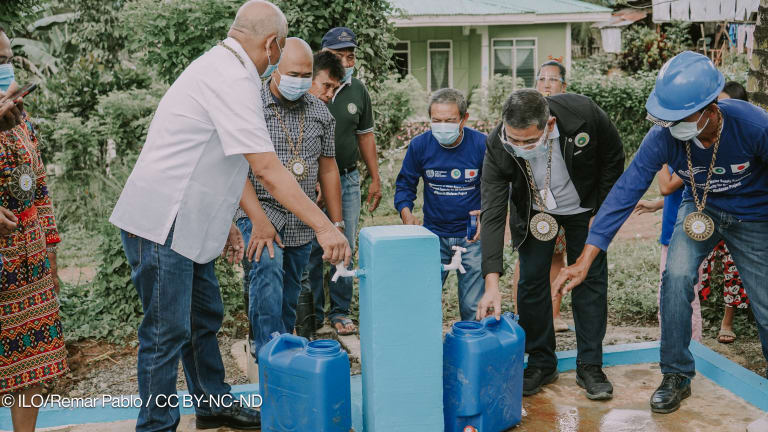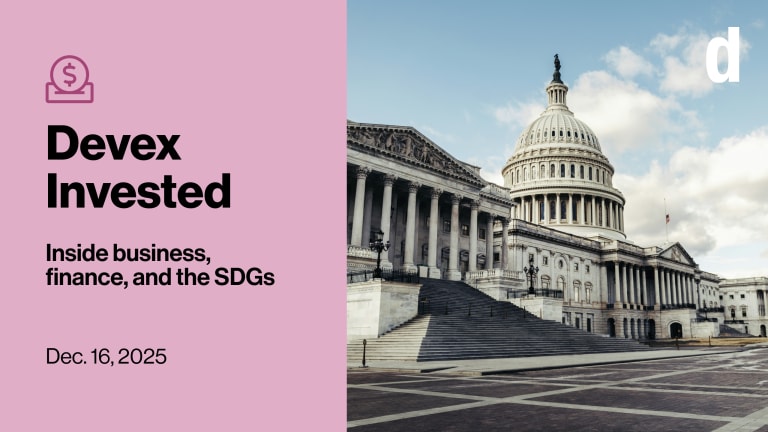
MANILA — The Asian Development Bank has just welcomed Niue, the tiny Pacific island nation that sits northeast of New Zealand, as its newest member. But there are questions on what a huge financial institution can do on an island with a population of just over 1,600.
“It's still at early stages. But what was very clear is that there [is a] very close set of common interests in Niue and in what we're doing already in the [Pacific] region,” said Emma Veve, director of the social sectors and public sector management division at ADB’s Pacific regional department.
Webinar: An inside look at ADB's Strategy 2030
Devex convened a panel of four high-level Asian Development Bank experts to give our audience an inside look at what Strategy 2030 means for ADB's direction and priorities.
This includes renewable energy solutions, which is of interest to many of ADB’s Pacific member countries, she explained. Initial discussions had highlighted the need to strengthen its central government systems around finance and state-owned enterprises and improve connectivity issues such as in transport and telecommunications.
But in the next weeks and months, bank and Niue officials will be embarking on a series of in-depth discussions to better determine where they can work together. It will be an opportunity for the bank to share its processes, and the range of services it can offer Niue, from knowledge sharing to capacity building.
Veve, who’s visiting Niue this week, will discuss with government stakeholders, but also talk with the private sector and public enterprises there and “listen to what they're interested in,” she said.
The plan is to identify which of ADB’s existing regional technical assistance Niue would like to be a part of since that can be achieved fairly quickly, Veve said. She also hopes to discuss ADB’s private sector development initiative, where the bank can help Niue’s government strengthen laws to make the environment more attractive for business investment.
For any consulting opportunities, ADB will need to classify the country first according to its creditworthiness and develop a country operations business plan, which may not be due until sometime next year. But, Veve said, there could be some consulting opportunities later in the year in Niue as part of its regional work.
Increased interest in Niue
The country’s ADB membership comes a few months after Australian Prime Minister Scott Morrison announced plans for new diplomatic posts in several islands in the Pacific, including Niue. The so-called “Pacific pivot” by Australia is perceived by some experts as the bilateral donor’s countermove to perceived rising Chinese interest and influence in the region.
In 2017, China spent close to $14 million on road reconstruction in Niue. In 2018, the government also signed a memorandum of understanding with China, joining its Belt and Road Initiative.
Terence Wood, a research fellow at the Development Policy Centre of the Australian National University College of Asia and the Pacific whose research focuses on Australian and New Zealand aid policies, acknowledges the presence of Chinese aid in the Pacific, but is dubious of China’s influence in Niue.
“Certainly donors are paying renewed attention to the Pacific at present because they're increasingly cognizant of the aid that China is giving to the region,” he told Devex. “But if [the rise of China in the Pacific] is what’s driving interest in Niue, it's a little crazy because Niue has a special relationship with New Zealand and I don't think it's going to sacrifice that relationship for increased ties with China.”
He said the secret to Niue’s “development success” is its partnership with New Zealand and the fact that Niueans can migrate to New Zealand if they want to. The majority of Niueans, more than 24,000, live in New Zealand, according to a 2013 census. Their remittances help fuel Niue’s economy.
New Zealand is Niue’s longest and biggest aid donor, with annual funding of over 14 million New Zealand dollars ($9.68 million) to the Pacific island nation. New Zealand aid supports the country’s goals of boosting its tourism sector as an economic resource, although Wood pointed out this is a “fairly constrained” area. There are other larger and better linked Pacific island countries such as Fiji.
New Zealand also supports the island’s renewable energy ambitions and strengthening the government’s governance. Part of that is budget support to allow the government to deliver core services in the areas of health and education.
“Niue, like many Pacific island countries, isn't that well governed, and so plausibly donors [such as ADB] may be able to help improve the quality of governance in the country,” Wood said.
“Having said that, attempts to reform and improve governance from the outside in most Pacific island countries haven't been that successful.”








